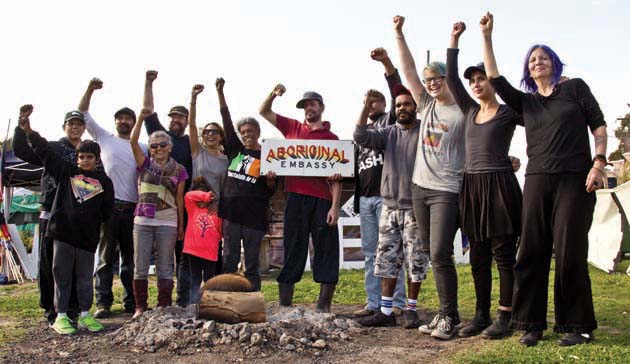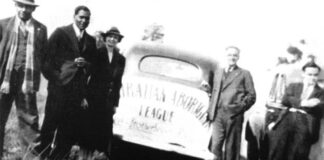The Redfern Aboriginal Tent Embassy (RATE) has won an inspiring victory. After more than 15 months of maintaining a protest camp at the Block in Redfern, in late August RATE forced guarantees about the inclusion of Aboriginal housing in the major redevelopment plan.
In a victory statement, Jenny Munro, one of the founders of RATE said: “The Embassy has demonstrated that for our people, resistance is the only way to go. For all the communities around the country facing closure—don’t talk sovereignty, assert your sovereignty. Put up an embassy and demand the funding for your basic rights. We will fight with you every step of the way.”
RATE was established in May 2014, obstructing attempts by the Aboriginal Housing Company (AHC), who currently control the Block, and construction firm Deicorp, to start work on “the Pemulwuy Project”, a commercial redevelopment. This includes a student accommodation complex (with plans to charge extortionist rents) and retail and office precincts.
Sixty-two dwellings, “affordable housing” for Aboriginal families, were included in the development application. But the AHC and Deicorp said they would need to wait ten to 20 years to build the housing from income generated through the commercial ventures.
Aboriginal leader Jenny Munro said that if these plans went ahead, “I predict within ten years the Block will be owned by developers”. Under the banner, “Aboriginal housing should be first not last”, RATE set up camp and refused to move. The land was won back in 1973 as a home for the inner-city Aboriginal community. This redevelopment was seen as the latest attempt by powerful interests to reverse this victory and disperse the community.
Many supporters, Aboriginal and non-Aboriginal, spent sleepless nights guarding the Embassy. Campers were assaulted by goons loyal to the AHC leadership. Police issued “trespass notices” and threatened force to disperse the camp.
In Sydney the rallies against plans to forcibly close communities in WA and SA were run out of RATE, with mobilisations of thousands of people marching to the Block to highlight the forced closure of an Aboriginal community in the heart of Sydney. RATE also became a base for organising against plans to hold a referendum to offer token “recognition” to Aboriginal people in the constitution, while assaults on Aboriginal rights progress apace.
Feeling the heat, Federal Indigenous Affairs Minister Nigel Scullion took measures to solve the dispute. During negotiations, the Minister was clear that he did not want to see police dragging Aboriginal people off the Block in the middle of a national debate about community closures. The Commonwealth Government offered $5 million to help build the “affordable housing” and committed to organising bank finance to ensure the remainder would also be built. The AHC were forced to agree to terms ensuring that Aboriginal housing will be built during the development’s first stage.
There are still dangers. It is a disgrace that the government is not providing all the funding needed to build the housing. Mortgaging the Block to access finance could see the AHC lose the land if they cannot meet payments. Minister Nigel Scullion has an agenda of changing Land Rights legislation around the country, to allow for similar mortgages to fund infrastructure and services that government should be providing as a fundamental right.
Along with the housing, the commercial side of the development will also go ahead, another disgrace given the homelessness crisis gripping Aboriginal communities.
The AHC still has an agenda of gentrifying the area, including by refusing tenancies for Aboriginal people who have criminal records. During the negotiations, the AHC reneged on a commitment to allow a RATE representative on their board to oversee the Pemulwuy project, after pressure was applied by Deicorp. The local Aboriginal community still has no access to the “commercial in confidence” agreements between the AHC and Deicorp. The battle continues to transform the organisation into one that is once again accountable to the community.
But by winning a commitment to build Aboriginal housing as part of the first stage of development, RATE has ensured that commercial interests will not be able to triumph and force the community out completely. Aboriginal people will retain a foothold in the heart of the city—an important base for resistance for many years to come.
By Paddy Gibson






